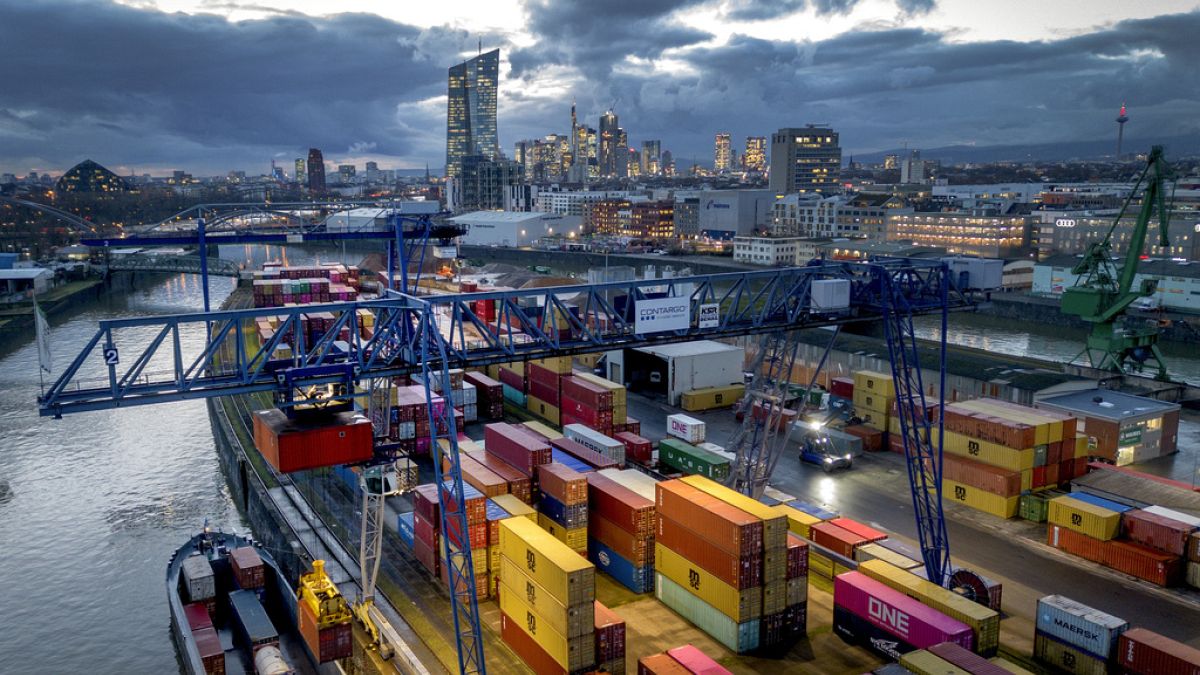Eurozone imports and exports declined in December 2023, according to first estimate data released by Eurostat on Thursday. Euronews Business summarises the data and findings.
The first estimate figures for euro area exports of goods to the rest of the world in December 2023 was €218.7 billion, a decrease of 8.8% compared with December 2022 (€239.9 bn). Imports from the rest of the world, meanwhile, stood at €201.9 billion, a fall of 18.7% compared with December 2022 (€248.3 bn).
As a result, the euro area recorded a €16.8 billion surplus in trade in goods with the rest of the world in December last year, compared with a deficit of €8.5 billion in December 2022.
Less fuel and manufactured goods purchased
Although EU imports overtook non-EU imports in December 2023, they still fell 3.9% compared to November 2023. This was mainly due to declining purchases of fuels, which dropped 38.3%, as well as manufactured goods, which fell 12.4%.
Crude material purchases also slid 19.6%, with food purchases declining 7.3%. Machinery and transport equipment dropped 9.8%.
Imports from Norway, Russia, China, the UK and Switzerland saw the most declines.
EU exports came in at €14.6 billion in December 2023, falling 4.5% from November 2023. This was marginally less than non-EU exports of €15.3 billion in December, which stayed the same as the previous month.
EU exports fell in December mostly because of fuel exports declining 25.4%, primarily due to a fall in crude oil exports to Poland. Moreover, manufactured goods dipped 9%.
Crude materials exports also fell by 11.4%, while machinery and transport equipment plunged 7.6%. Exports to Norway, Japan, Switzerland and Russia saw the most declines.
Red Sea attacks and slow growth present challenge for EU
Although the eurozone somehow managed to avoid a recession in 2023, the beginning of 2024 has still remained quite subdued. The European Commission has slashed the EU's growth forecast for 2024 to 0.9%, with the euro area expected to see a growth of 0.8%.
Inflation is also expected to fall more than previously anticipated. This has led to renewed hopes that the European Central Bank (ECB) may potentially cut interest rates sooner than expected, in summer this year, if not, spring.
However, the ECB has consistently warned of the potential damage of cutting rates too fast or too soon and has reiterated that it will be taking a data-dependent approach for monetary policy. This will ensure that inflation is well and truly under control before any monetary loosening steps are taken.
The ongoing Red Sea attacks could also significantly disrupt imports and exports from China and Japan, as Asian routes are the most impacted. This is due to several shipping companies such as Maersk, Hapag Lloyd and Mediterranean Shipping Company (MSC) having to pause their transits through the Red Sea and Suez Canal because of increased attacks on commercial ships.
This in turn, could drive the price of several goods up, as well as disrupt the availability of others, about which Tesco, Marks and Spencer, Next and several other retailers have already warned.



